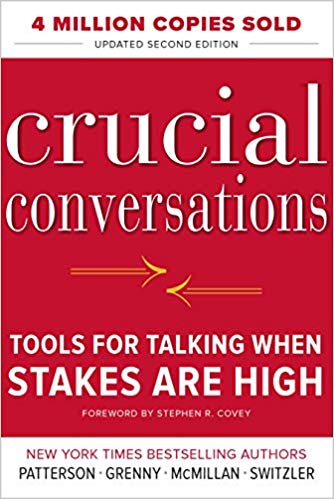

This article is an excerpt from the Shortform summary of "Crucial Conversations" by Kerry Patterson. Shortform has the world's best summaries of books you should be reading.
Like this article? Sign up for a free trial here .
Are you looking for discussion questions for the book Crucial Conversations? How can these exercises help you improve your communication skills?
A crucial conversation is a discussion characterized by high stakes, differing opinions, and strong emotions. If handled poorly, these stressful conversations can derail and even destroy relationships.
Here’s a brief background of the book along with Crucial Conversations discussion questions.
Crucial Conversations Discussion Questions
Poorly handling crucial conversations—discussions with high stakes, different opinions, and strong emotions—is the cause of many of our most painful problems in work and home life. These stressful conversations can rapidly go awry, with people behaving at their worst—yelling at each other and sniping sarcastically, or on the other side going silent and withdrawing. When this happens, little progress is made, and resentment builds. Moreover, we often deliberately avoid having these conversations because we’re afraid we’ll make matters worse.
Crucial Conversations teaches you an array of dialogue principles and practical skills, explained and demonstrated through numerous examples. When you learn to handle crucial conversations effectively, the quality of your relationships and your effectiveness in your career will improve dramatically, and you’ll be able to help get everybody what they want.
Here are some Crucial Conversations discussion questions to ponder.
Discussion 1: Your Crucial Conversations
A crucial conversation is a discussion characterized by high stakes, differing opinions, and strong emotions. Your skill in handling these conversations directly affects your success at work and in your personal relationships.
- Think of a crucial conversation at work that you’re avoiding or not handling well. How could handling it successfully boost your career?
- Think of a recent crucial conversation in your relationship. How would you grade yourself on the way you handled it? How would improving your dialogue skills benefit your relationship?
- Are certain conversations that haven’t gone well bothering you? Which ones would strengthen your health and well-being if you handled them better?
Discussion 2: Monitoring Yourself
You can get so involved in the content of an intense conversation that you lose track of what you’re doing and how others are reacting (your brain disengages and your emotions predominate). For conversations to be successful you need to pay attention to both the content and the conditions, so you can adjust if a dialogue goes off track.
- Think about some of your toughest conversations. What were the cues (physical, emotional, behavioral) that your brain was beginning to disengage, and your emotions were driving you away from dialogue?
- How can you respond to those cues in the future to stay in a constructive conversation?
- What is your style under stress? When conversations become heated, do you typically respond with silence (withdrawing) or violence (becoming verbally aggressive)? Give an example of a recent crucial conversation where you behaved that way.
- Taking cues from the chapter, what could you do differently under stress?
Discussion 3: Finding a Mutual Purpose
Sometimes we end up in a debate because we have different purposes or goals. The best approach is to stop debating, back up, and create a mutual purpose. (The CRIB steps—Commit, Recognize, Invent, Brainstorm—may help.)
- Think of a crucial conversation that you need to have in your relationship. Do you have a mutual purpose—do you agree on what you want to see happen? If so, what is it?
- If you’re at odds on a purpose, consider what you and your partner each want. (For instance, if you disagree about how to manage your bank account, what do you each want in the short term? Maybe you want to go out and have fun to relieve stress, but your partner wants to curb spending to ensure there’s always enough money to pay bills and handle emergencies.)
- Next, consider something you can agree on that you both really want long-term. (For instance, maybe you both want to avoid the stress and limitations of having bad credit.)
- What strategy will enable you to achieve this mutual purpose and get what you each want in the short term? (For instance, agreeing on a monthly entertainment budget so you can have fun but also not exceed your bank account.)
Discussion 4: Making Contrasting Statements
When someone in a crucial conversation mistrusts your motives, you can use the technique of contrasting to help reassure them and get the dialogue back on track. You do it by first stating what you don’t want or intend, followed by what you do want.
- Think of a touchy conversation you’re reluctant to have because you’re concerned the other person will get the wrong impression. Write a contrasting statement that you could use to reassure the person.
Discussion 5: Master Your Story
When we see and hear something that affects us, we tell ourselves a story explaining what happened, which then drives how we feel and behave. This can be counterproductive, but we can change our stories and therefore our emotions.
- Think of a time when you felt very strongly about something someone said or did. What story did you tell yourself to generate your feelings?
- Was it a clever story? What type — a victim, villain, or helpless story? How did you feel as a result?
- Go back to the beginning and review the observable facts (what you saw and heard). Did you omit something about your own role? What alternative story could you tell based on the facts?
Discussion 6: Decision-Making
Four common ways of making decisions are: command, consult, vote, and consensus. Which method to use depends on the circumstances. You choose based on four questions: Who has a stake, who has the knowledge, who needs to be on board, and how many people need to be involved.
- Think of an important decision you recently took part in or were affected by. How was the decision made?
- What other decision-making method could have been used? How might it have affected the decision?

———End of Preview———
Like what you just read? Read the rest of the world's best summary of Kerry Patterson's "Crucial Conversations" at Shortform .
Here's what you'll find in our full Crucial Conversations summary :
- How to approach an argument without getting mad
- The mistakes most people make when trying to listen to someone else
- How to come up with win-win solutions that make everyone happy






